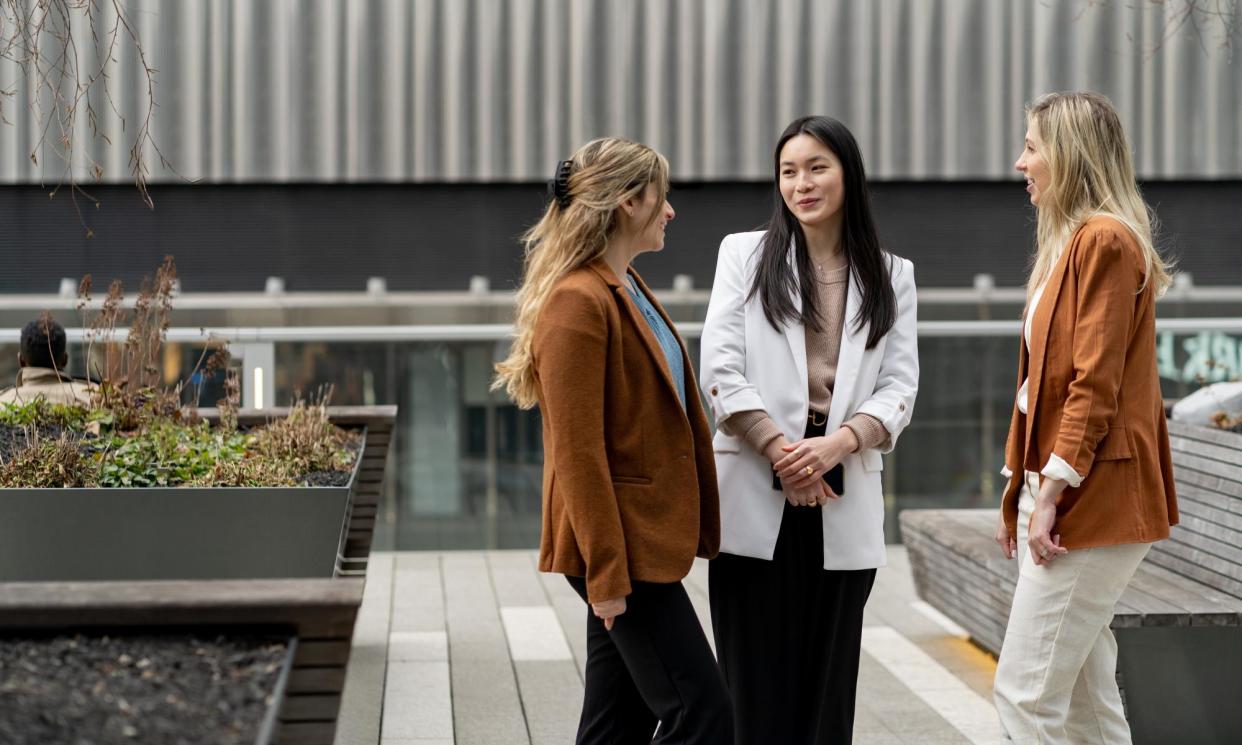‘What 22-year-old attends meetings like this?’: two young professionals on forging ahead in their careers

Karun Nayyar was just four months into his job when he experienced his first major career highlight when he attended a meeting at a racetrack. “I found myself watching cars whiz around, followed by lunch where I sat opposite a CEO of a multinational,” says the graduate trainee, who works in the tax department at KPMG Reading. Such outings are not an everyday occurrence for Nayyar or his colleagues, and he says he remembers thinking at the time: “What 22-year-old attends meetings like this?”
Before joining the business in 2021, Nayyar, now 24, had studied aeronautical engineering at Loughborough University. Even though he had no previous knowledge of tax, KPMG took him on. In his first week, he was allocated a “buddy”, a graduate a year ahead of him. “When you’re new, you’re scared to ask silly questions, but the buddy provides a safe space for this: I’m always bouncing questions off him.”
Many people assume working in tax only involves filling out tax returns, says Nayyar, but that couldn’t be further from the truth. “We have an advisory role, which involves speaking with clients, understanding their issues and helping solve them. As a graduate, you take on that responsibility with a caveat: everything gets reviewed so mistakes can’t slip through.”
KPMG has a range of graduate opportunities nationwide, and participants are encouraged to build relationships through employee networks, volunteering and community initiatives. Its workforce is a relatively young one, with about 85% millennial or Gen Z.
Employees are encouraged to show their personality and feel confident about adding insights – even if they’re the most junior person in the room, says Nayyar. “Leaders want you to be yourself, not some corporate robot.”
As well as help with career development, staff are offered other types of support to enable them to do their best work. Yssy Hardy, 22, who joined KPMG Gatwick as an audit apprentice three years ago, has endometriosis and suffers with debilitating pain every day. “Early in my apprenticeship, I was struggling balancing working with my exams,” she says. Her manager arranged private chronic fatigue coaching, which helped her discover ways to preserve her energy. “KPMG also got me a supportive chair for my back and arranged 25% extra study time. I no longer go straight to bed with exhaustion when I get home. It’s great.”
Before joining KPMG, Hardy had been accepted by five universities to study pharmacy. “My family were delighted,” she says. “I would have been the first in the family to attend.” But she decided against further education, instead applying for an audit apprenticeship. “It offered the chance to get the career I want without any debt.” And despite her family’s initial reservations, they have completely changed their opinion, she says.
Hardy likens working in audit to tackling a financial jigsaw, and says it’s a great foundation for an accounting career as you learn how businesses operate. “It’s almost like completing a puzzle, you have to put all the individual pieces together to create the bigger picture.”
Alongside her day-to-day role, she sits on KPMG’s charity committee, which involves everything from raising donations to pro bono work. She has also spoken at a Women of the Future event at London’s Leicester Square.
Every employee gets six days a year to volunteer. This could be doing anything from cleaning a garden for a charity to helping an organisation put together a business plan.
The company has a range of strategies to support staff wellbeing, especially for those in the early stages of their careers. Karl Edge, chief people officer at KPMG UK, is an advocate of energy management (rather than time management). “We encourage people to do 45-minute meetings instead of hour-long meetings with a 15-minute break, or to do meetings outside, because a change of scenery and fresh air can help boost energy and avoid that mid-afternoon slump. We’ve even got beehives at some of our premises – that employees sometimes visit.”
The firm’s “come as you are” philosophy aims to help people to feel comfortable being themselves at work, recognising that differing experiences and backgrounds can make the firm stronger.
“I joined KPMG in 1991; I believe one reason I was recruited is because I was ‘different’,” says Edge. “I was from a working-class background, trained to be an actor and had little understanding of professional services. Yet somebody at KPMG realised I could bring a different perspective. It’s the same 33 years later.”
Commenting on whether to take the apprenticeship or graduate route, Edge says: “Both programmes are equally important pathways, with graduates and apprentices receiving the same technical qualification and support. Career progression is the same: one former apprentice, Nicole, joined us as a school leaver. Fifteen years on, she’s a director.”
For Hardy, the financial independence of being an apprentice is a definite perk. “It’s a nice feeling to be able to go on lovely holidays, get a new car, go out for dinner – you get to live life, essentially. I’ve also got the payslips for the mortgage I want.”
Nayyar adds that the social aspect of work is a big plus. “The graduate programme is hard work – 15 exams in the past three years – but KPMG is such a social organisation: I play weekly five-a-side football, plus I am part of KPMG’s Hindu and Sikh network. There’s a games room with table tennis and PlayStation 5 too.”
Both programmes give participants a head start in their careers. Giving audit as an example, Edge says: “In audit, trainees can find themselves working with all manner of companies, from big FTSE 100 businesses to charities. They see how businesses are run from the bottom up. For anybody who wants to run their own business, it’s a great way to get the skills. It’s arguably the best business training you’ll ever get.”
To start your career with KPMG, visit kpmgcareers.co.uk


